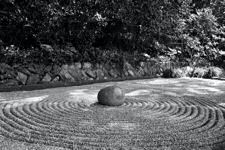Centering: A Little Bit At A Time
November 1, 2021REV. DR. MICHAEL TINO
Lead Ministry Team, Church of the Larger Fellowship
If there is to be peace in the world,
There must be peace in the nations.
If there is to be peace in the nations,
There must be peace in the cities.
If there is to be peace in the cities,
There must be peace between neighbors.
If there is to be peace between neighbors,
There must be peace in the home.
If there is to be peace in the home,
There must be peace in the heart.—Taoist philosopher, Lao-Tse, sixth century BCE
Philosophers and theologians throughout the ages have pondered the roots of peace, and have come to the conclusion that peace between and among people is not possible without smaller bits of peace, especially peace within oneself. “Let there be peace on Earth and let it begin with me,” the popular song goes.
Peace within oneself is the challenge of centering: How do we center ourselves? How do we go within and cultivate peace?
Many people turn to spiritual practices to do this. Spiritual practices are regular things that we do that connect us with something greater than ourselves, and there is not one right way for everyone to engage in them. We each need to figure out what it is that gives us that feeling of inner peace, of centering.
But the trick to spiritual practice is doing it regularly, and if we’re already overwhelmed by the world or our circumstances, one more thing to add to our day is just one more thing to knock us off of our center, one more thing to cause anxiety instead of cultivating peace.
I have begun to think about this differently.
Instead of carving out twenty minutes to sit in meditation, or an hour to walk a labyrinth every day, I find moments of spiritual centering throughout the day.
In giving advice to people in caring professions about cultivating peace and centering themselves, psychologist Ashley Davis Bush writes about “micro-practices,” one-moment-long glimpses of peace and mindfulness. Bush encourages people to fit them in throughout the day—in the pauses and cracks around other things, with no pressure or timeline or necessary outcome.
Take a breath. Notice how the air moves in and out of your body. Just one long, slow, deliberate breath.
Drink a glass of water. Feel it fill your body and think about how you will absorb that water.
Take just a moment and visualize in your mind something that makes you feel happy, or calm, or connected, or grounded. Choose an image and come back to it—just for a few seconds—throughout the day.
Choose a few words to guide you, and repeat them in your mind every now and then, whenever you’re feeling unmoored. “I am grounded,” perhaps, or “I am loved.”
Spend a moment acknowledging the difficulties in your life right now. They are real. You are real. Your pain is real, too, but it does not own you.
Find a way—a small way—every day to connect to another person. Write a letter to your pen pal. Smile at a friend, or if it’s safe to do so, a stranger. Help someone out. Cultivate the knowledge that you are not alone in this world.
Think of something you’re thankful for. Take just a moment to feel gratitude.
Say something kind to yourself.
These practices don’t need to be long—ideally they’re just a minute, a moment, a breath. And they are all ways to connect to our center, to cultivate peace within our hearts, and to connect to something beyond our individual being.
Let peace begin with you. Let peace begin in your heart. Find your center, a little bit at a time.
- Winter Magic - December 12, 2024
- Post-Election Message - November 20, 2024
- On Covenant and Accountability - September 11, 2024
Quest Monthly Print Edition
Recent Issues
Latest Spiritual Reflection Posts
Weekly Newsletter
About
Quest for Meaning is a program of the Church of the Larger Fellowship (CLF).
As a Unitarian Universalist congregation with no geographical boundary, the CLF creates global spiritual community, rooted in profound love, which cultivates wonder, imagination, and the courage to act.
Contact
Church of the Larger Fellowship Unitarian Universalist (CLFUU)
24 Farnsworth Street
Boston MA 02210


